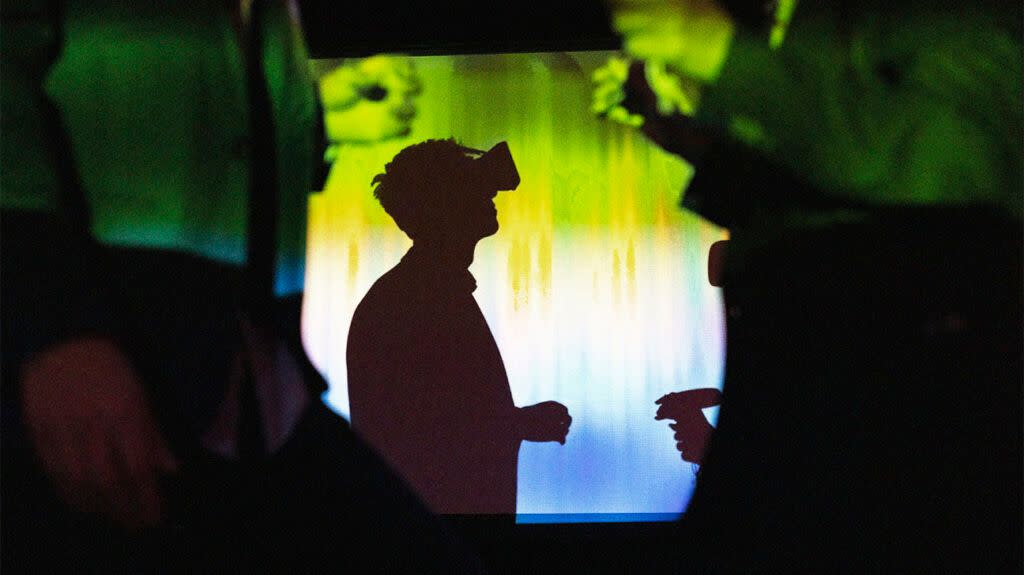Depression: Virtual reality may help improve mental health

This article originally appeared on Medical News Today
Virtual reality treatment for major depressive disorder is as effective as a current first-line therapy in a new study from Stanford University.
There is some suggestion in the study, however, that the virtual reality system’s benefits may be related to the placebo effect.
Further investigation is warranted, and may result in virtual reality being added to existing therapies.
A new study investigates the use of extended reality headsets in treating major depressive disorder.
The authors of the study — which appears in JMIR Mental Health — found that virtual reality treatment showed promise, producing results equivalent to current telehealth therapy for depression.
Extended reality (XR) places a headset wearer in a synthesized virtual reality (VR) environment of sight and sound.
The current study compared the efficacy of one of the the current first-line intervention for major depressive disorder (MDD), behavioral activation therapy, with an extended reality-enhanced version the study refers to as “XR-BA.”
The researchers suggest that XR-BA therapy may offer more enjoyable treatment, thus encouraging patients to continue receiving it.
How do we know if VR helps treat depression?
The primary measure used in the study were the participants’ scores in their responses to a Patient Health Questionnaire (PHQ-9) conducted via telephone. Higher PHQ-9 scores indicated more severe MDD.
The study involved 26 participants who were randomly assigned to receive either a 3-week, 4-session course of behavioral activation therapy, or to a group receiving similarly configured sessions of XR-BA therapy. The XR-BA participants were outfitted with Meta Quest 2 virtual reality headsets.
Participants’ mean age was 50.3 years, plus or minus 17 years. Of these, 73% were women, 23% men, and 4% nonbinary or of a third gender.
Both groups exhibited a similar and statistically significant reduction in their PHQ-9 scores, as well as in the severity of their symptoms, between the beginning and end of the trial.
Among the XR-BA group, PHQ-9 scores dropped even before the first session, suggesting positive feelings regarding the upcoming trial, and a placebo effect.
Virtual reality may help ‘reduce barriers’ to depression care
For individuals with MDD who are interested in new technology, XR-BA therapy may present therapeutic content within a compelling environment.
First author Margot Paul, PsyD, MS, clinical assistant professor in the Department of Psychiatry and Behavioral Sciences at Stanford University, explained in a press release:
“Clinicians could use XR as a treatment tool to help motivate clients to actively participate in their psychotherapy treatment by completing ‘homework’ that is novel, fun, and accessible. These results indicate that XR may help to de-stigmatize mental healthcare and reduce barriers to individuals seeking care.”
Is the placebo effect involved?
Şerife Tekin, PhD, assistant professor at the Center for Bioethics and Humanities at SUNY Upstate Medical University, who was not involved in the study, told Medical News Today that, while the placebo effect may have something to do with XR-BA’s positive mental health impact, it is still worth investigating further.
“We do know,” said Tekin, “both from research and patients’ first-person reports, that active engagement in one’s own recovery process strengthens patients’ agency and feelings of control and command over their environments and lives.”
After sometimes-challenging training in the navigation of a VR world, the individuals receiving XR-BA treatment were presented a wide range of engaging activities.
These included playing a magical board game, practicing games of mastery, solving clue-based puzzles, dancing to music, and having the opportunity to “play” mini-golf by themselves or with others.
Tekin suggested XR-BA may be “an antidote to what depression makes one feel like.”
“Usually, the individual withdraws from previously enjoyed activities, and is more isolated from their community, and there is a state of almost non-action,” she said.
However, in this study participants “may have felt energized, entertained and — most importantly — felt like they are in charge while physically pushing buttons to play a game,” Tekin surmised. “This may have contributed to the effectiveness of VR.”
Important to ‘move with caution’ in recommending VR for depression
“Psychiatry has a history of being extremely excited about one new form of intervention, putting so much hope into it,” said Tekin, “investing all the research funds and efforts on that intervention, only to be disappointed later.”
“We do have research and plenty of testimonial evidence,” Tekin pointed out, “that shows that when it comes to mental disorders, a mix of different interventions have a better chance of enabling the patient to deal with their disorders rather than one.”
“This is primarily because human selves are complex, and it is hard to find one intervention that works for everyone,” she added.
While it may be plausible to add XR-BA to the list of therapies above, it is important, the expert noted, to “move with caution and make sure that the patient is given the opportunity to use multiple kinds of treatments to find what best works for them.”
Virtual reality may help treat other mental health conditions
Encouragingly, there has been previous research regarding the use of VR for people with post-traumatic stress disorder (PTSD).
“In these studies, the scenes and episodes that have had a traumatic impact on the veteran get simulated in VR in a more controlled environment,” reported Tekin. “This [provides] the veteran exposure to the trauma-generating event, but [also to] feel more in charge, as they can stop the VR at any moment.”
Tekin added that she believes the new study’s investigation has promise “as long as we make sure that patients receive these kinds of novel interventions on top of their regular treatments.”
View the original article on Medical News Today
